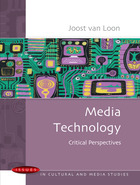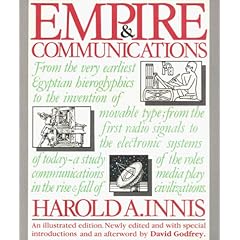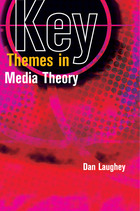Joost Van Loon: Media Technology: Critical Perspectives (2007)
Filed under book | Tags: · media, media theory, new media, technology

What are media? Why are more and more objects being turned into media? How do people interconnect with the media in structuring their everyday lives? In “Media Technology: Critical Perspectives,” Joost van Loon illustrates how throughout the course of society, different forms of media have helped to shape our perceptions, expectations and interpretations of reality.
Drawing on the work of media scholars such as Marshall McLuhan, Walter Benjamin, Roland Barthes and Raymond Williams, the author provides a theoretical analysis of the complexity of media processes. He urges the reader to challenge mainstream assumptions of media merely as instruments of communication, and shows how the matter, form, use and purpose of media technologies can affect content.
The book uses practical examples from both old and new media to help readers think through complex issues about the place of media. This helps to create a more innovative toolkit for understanding what media actually are and the basis for trying to make sense of what media actually do. It uses case studies and examples from television, radio, print, computer games and domestic appliances.
“Media Technology” is essential reading for undergraduate and postgraduate students on media, social theory and critical theory-related courses.
Publisher McGraw-Hill, 2007
ISBN 0335214460, 9780335214464
Length 174 pages
More info (publisher)
More info (google books)
Harold A. Innis: Empire & Communications (1950/1986)
Filed under book | Tags: · communication technology, history of communications, media, media theory, theory of communication

It’s been said that without Harold A. Innis there could have been no Marshall McLuhan. Empire and Communications is one of Innis’s most important contributions to the debate about how media influence the development of consciousness and societies. In this seminal text, he traces humanity’s movement from the oral tradition of preliterate cultures to the electronic media of recent times. Along the way, he presents his own influential concepts of oral communication, time and space bias, and monopolies of knowledge.
Keywords and phrases
Babylonia, monopoly of knowledge, papyrus, Hittites, Egypt, Byzantine empire, Persian empire, Sumerian, oral tradition, Hyksos, Dionysus, Assyrian, Kassites, Orphism, monasticism, Roman law, Mitanni, Werner Jaeger, Aramaic, Athens
Edited by Dave Godfrey
Publisher Press Porcépic, 1986
ISBN 0888782446, 9780888782441
Length 184 pages
More info (wikipedia)
More info (google books)
Dan Laughey: Key Themes in Media Theory (2007)
Filed under book | Tags: · media, media theory

Key Themes in Media Theory provides a thorough and critical introduction to the key theories of media studies. It is unique in bringing together different schools of media theory into a single, comprehensive text, examining in depth the ideas of key media theorists such as Lasswell, McLuhan, Hall, Williams, Barthes, Adorno, Baudrillard and Bourdieu.
Using up-to-date case studies the book embraces media in their everyday cultural forms – music, internet, film, television, radio, newspapers and magazines – to enable a clearer view of the ‘big picture’ of media theory.
In ten succinct chapters Dan Laughey discusses a broad range of themes, issues and perspectives that inform our contemporary understanding of media production and consumption. These include:
* Behaviourism and media effects
* Feminist media theory
* Postmodernity and information society
* Political economy
* Media consumerism
Publisher Open University Press, McGraw-Hill, 2007
ISBN 0335218148, 9780335218141
Length 248 pages
More info (publisher)
More info (google books)

